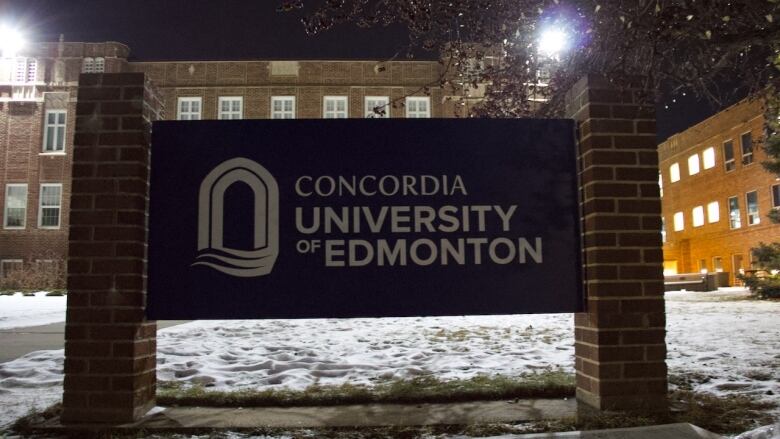Concordia University of Edmonton faculty association could be first in Alberta to strike
University says its primary goal is reaching a fair and equitable collective agreement

Concordia University of Edmonton's faculty association could be the first in Alberta to go on strike.
The Concordia University of Edmonton Faculty Association (CUEFA), which represents 81 full-time professors, librarians, placement coordinators and lab instructors, has been negotiating a new collective agreement with the university since the spring.
A strike authorization vote on December 1 saw 90 per cent support a strike, with about 95 per cent of the association's members participating in the vote.
The results mean the association could choose to strike anytime within 120 days.
"We obviously want to minimize the harm to the students, but at the same time, we do have to stand up for our own health and we do have to stand up for our own working conditions," CUEFA interim president Glynis Price told CBC News on Monday.
According to Price, the university has been approved to lockout staff, should they choose to do so. In the case of a strike or a lockout, 72 hours notice is required.
An emailed statement from the university said it has a primary goal of reaching a fair and equitable collective agreement with the association and to avoid any disruptions.
"We are hopeful that ongoing negotiations will achieve a reasonable and mutually beneficial agreement as soon as possible," the statement said.
'Highly unusual' workload
Price said the faculty association's biggest point of disagreement with the university pertains to workload.
In negotiations, she said, the university offered a "highly unusual" workload that reduced the number of courses some teachers would have to teach by one, but increased research expectations for everyone.
Price said higher teaching loads are common at colleges and undergraduate-focused universities, but Concordia is in the process of transitioning to a research institution.
The association is also concerned about job security, in particular, language in the university's proposal on discipline that would allow faculty members to be disciplined without cause.
On its collective bargaining website, the university said the parties disagree over "relatively minor" adjustments about faculty discipline and the school "expects this item will be fairly easily resolved."
Regarding workload, the university said a mediator suggested the two sides continue bargaining.
The right to strike
Bob Barnetson, a labour relations professor at Athabasca University, said faculty strikes in other provinces have proven to be effective at putting pressure on post-secondary institutions.
They typically last no more than six weeks, he said, "at which point, employers cave and give up more than they had originally hoped to."
Faculty associations did not have the right to strike until the Alberta government passed a 2017 bill that moved faculty collective bargaining under the Labour Relations Code.
Concordia may be the first faculty association to vote in favour of a strike mandate since the bill was passed, but Barnetson said other universities, including the University of Alberta, the University of Lethbridge and Mount Royal University, could also be headed in that direction.
Barnetson, who is involved in the collective bargaining process at his own institution, said the Concordia faculty association's workload claim is reasonable.
He said professors at research universities typically teach fewer courses to make up for their research and administrative responsibilities.
A strike could happen at any time, so long as the association gives the school at least 72 hours notice, but he said it would be more advantageous for the union to wait until students are in class again in the new year.
'Students are nervous'
James Wakelin, president of the Concordia Students' Association, said he has received letters and emails from students, departments and faculty members about the dispute.
He said in general, students support the faculty, but a strike would interrupt their education and could derail graduating students' plans.
"I know lots of students are nervous and a little frightened for the next semester," he said.
Price said she understands students' worries, but if teachers are stressed and burned out, that will also affect students' learning environment.

